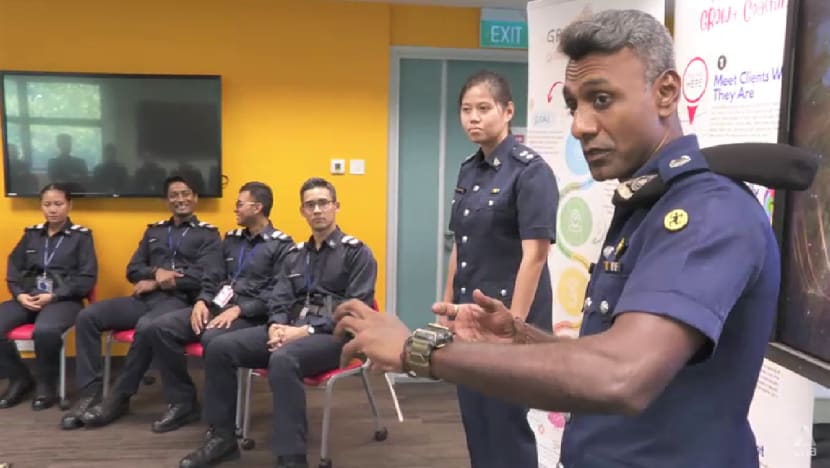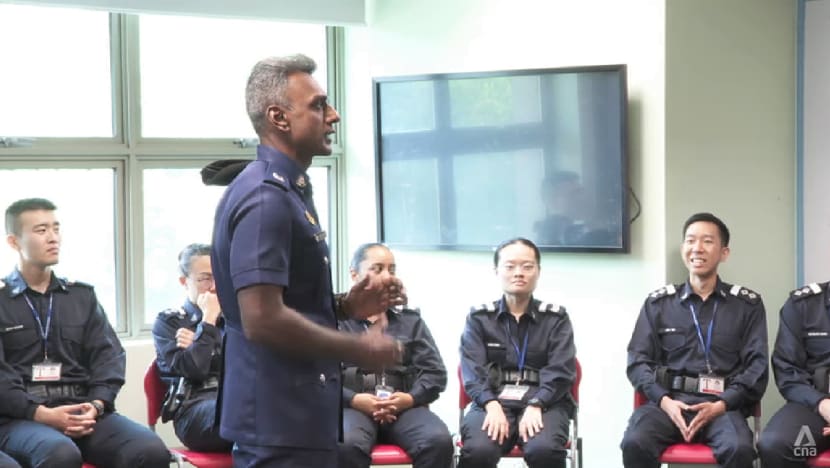Prisons to increase in-house coaches to equip officers with soft skills needed to help rehabilitate inmates
One inmate, who has found her purpose in the kitchen, credits her rehabilitation officer for taking time to listen and encouraging her to pursue her dreams.

The Singapore Prison Services (SPS) is boosting its number of in-house coaches, as it looks to equip more officers with the soft skills needed to help in the rehabilitation of inmates.

This audio is generated by an AI tool.
SINGAPORE: Brenna (not her real name) is chasing her dream of becoming a chef, while serving part of her 18-month jail sentence for drug offences out in society, through a community programme.
Inmates who get the opportunity to serve part of their sentence outside prison have to follow strict rules, such as being home by a certain time, and they can pursue ambitions where employers give them a chance.
The 21-year-old, who is now a chef at food and beverage business Paradise Now, said the eight months behind bars was a huge wake-up call.
“I took a lot of time for self-reflection. I thought a lot,” said Brenna, who is serving the remaining 10 months of her sentence in the community. “I asked myself, “Is this the life I want to continue living or should I make a difference?’
“So I planned out my future, what I want to do (and) where I want to be.”
LENDING A LISTENING EAR, OFFERING EMOTIONAL SUPPORT
The Singapore Prison Services (SPS) is boosting its number of in-house coaches, as it looks to equip more officers with the soft skills needed to help in the rehabilitation of inmates.
These certified coaches, known as coaching champions, will develop programmes and teach fellow officers how to lend a listening ear and provide emotional support to inmates, in a bid to reduce recidivism rates.
The SPS wants to raise the number of certified coaches to 15 by 2026, from the current two.
Prison officers partner inmates in their rehabilitation journey, and an empathetic prison officer could make a difference in guiding inmates towards the right path, said Singapore Prison Training Institute senior trainer Venu Arsh.
“What we aim to achieve is building an empowered relationship,” added the experienced instructor, noting that this involves gaining inmates’ trust and getting them to open up.
“Although we are (officers) and we are in the process of rehabilitating the inmate, we want to build a very empowered relationship, where the inmate doesn't see just the uniform but he knows that we are sincerely there to (rehabilitate) him.”
By connecting deeply and meaningfully with the inmates, they will then “have this intrinsic motivation to change themselves for the better”, he added.
“And at the same time, coach-like behaviours will also spread like a ripple effect.”
Coaching was introduced by the SPS in 2001. The agency has been devoting resources towards professionalising coaching training and developing in-house capabilities to deepen its coaching culture.

CHANGING LIVES
“It is essential for staff to engage in purposeful interactions not only with their co-workers but also inmates and supervisees under their charge,” said the SPS.
“Therefore, staff will be trained to contextualise and apply coaching skills in their daily operational engagements, strengthening the ongoing rehabilitation and reintegration efforts.”
The approach has ignited a flame in Brenna and many other inmates.
For Brenna, she found her purpose in the kitchen and is ready for a new chapter in life.
“I just enjoy cooking, but I never thought it would become a career. This is what I want to do for the rest of my life, if I can,” she said.
“I feel more motivated. I am actually enjoying something, I am actually doing something I like.”
Paradise Now director Jonathan Koh has been impressed with her work ethic, as she has shown her passion and drive to excel in the field.
“I think what she brings to the kitchen is creativity, hard work, and definitely a passion for cooking. The passion to be able to push the dishes further at every step is definitely what every kitchen will look for,” he said.
“I won’t be surprised to see her running her own restaurant someday in the future.”
Mr Koh added: “It is not easy, definitely not an easy industry to be in, and even harder to excel in.
“I think she really put in a lot of dedication and showed me that she really wanted to work hard to achieve her dream of becoming a cook. I felt that we could really help her, to help her excel.”
Related:
GIVING INMATES A SECOND CHANCE
He encouraged more companies to offer opportunities to give inmates a second chance.
“Everyone has their own dreams and aspirations,” he said. “I think we should see how we can enable that person to excel in life as well as in their career path.”
Brenna credits her rehabilitation officer, who has been a constant support for her, and believes she would not be where she is if not for her.
“Everything she says is really touching to me. She is like not just a ma'am to me. She is like a friend to me as well,” she said.
“She will tell me that she has faith in me, she will motivate me, and she will actually take time to listen.”
Community Corrections Command assistant manager for its residential scheme and direct release programme Felicia Chee, who is Brenna's rehabilitation officer, is among the few in the SPS who is attaining a coaching certification on soft skills. These include asking impactful questions and listening intently.
She said she is still learning to build the skills “of how to be in that moment with the person and instead of telling the person what they need to do, allow them to realise for themselves what is important”.
The coaching skills have allowed her to have a better conversation with inmates by listening “to what they have to say and what they do not say, and also to use my intuition,” added Ms Chee, who is already imparting her knowledge to prison officer trainees.
“So for some of my engagements with my supervisees, I kind of sense that there's some things that are left unturned, unsaid. So I will ask for their permission - which is also another skill of coaching - whether I could explore with them a little bit more what actually matters to them.”




















